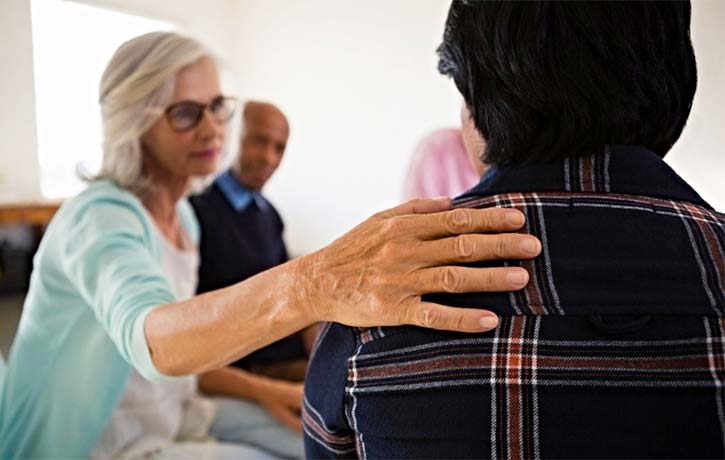
With the COVID-19 pandemic wreaking havoc on thousands of lives, we thought it especially pertinent to look closely at the alarming increase of alcohol overconsumption and abuse in the UK and how people can address it – and hopefully get to the bottom of it.
Dr Niall Campbell, has been a consultant adult general psychiatrist since 1996, initially completing 6 years in the NHS at Tolworth Hospital. In 2002, Dr Campbell joined Priory Roehampton as a full time adult general psychiatrist. In 2013, he became the lead consultant for addictions. Dr Campbell has considerable experience in treating patients with affective disorders including depression and bipolar disorder as well as psychotic disorders such as schizophrenia, anxiety states including panic disorder and post-traumatic stress disorder (PTSD). In addition to completing his medical degree (MBBS) in 1983 at Charing Cross Hospital, London, he became a member of the Royal College of Psychiatry in 1991.
If you’re worried about a friend, family member, relative or other close person and their relationship with alcohol, please read on for some useful information, tips and perspectives for change in our exclusive feature, Alcohol Addiction: An Interview with Dr Niall Campbell — Priory Hospital.
Greetings Dr Campbell,
It’s good to connect with you and we hope you’re keeping well. Welcome to Keep Fit Kingdom and thanks so much for taking some time out to share with us. Our mission is to help a billion people reach 100 years of age happily and healthily, what is your impression about that?
Helping people to live a happy and healthy life, regardless of the age that they reach, is highly commendable!
- Addict viewing greener pastures
- Group therapy is key to gaining new perspectives
Thank you! Okay, so let’s start off with some basics:
Background & Career
Please briefly outline your story and journey. How did you get into the area of alcohol addiction? What’s the most challenging part about your work and what’s the most rewarding?
I am a consultant psychiatrist at Priory Hospital Roehampton, where I have been the lead addiction consultant for 10 years.
I qualified as a doctor in 1983 and have been a psychiatrist since 1987. From the beginnings of my time at medical school, I could see how substance abuse could have so many negative consequences. I felt that I had something to offer working in this field.
As part of my role at Priory Hospital Roehampton, I work with the Addiction Treatment Team and patients who are undertaking the residential programme. I also see people on an outpatient basis, which involves carrying out assessments for those dealing with addiction problems.
One of the most challenging parts of my work is motivating people who don’t recognise the consequences of their addiction and don’t want to change. On the rewarding side – I have been privileged in this job to meet people from all walks of life, and support them in their recovery from active addiction.
The Alcohol Epidemic in the Pandemic
With the levels of stress experienced due to the coronavirus pandemic and the lockdown, in the UK (and beyond), alcohol consumption has begun to spiral out of control. How effective would you say Dry January has been historically and statistically in terms of getting out of the addiction?
Dry January is a good opportunity for people to pause and think about their relationship with alcohol. Alcoholchange.org found that amongst those who take part in Dry January, 59% reduce their alcohol consumption in the following months, 49% feel they have better control over their drinking, and 43% report having better mental well-being.
For anyone who is drinking heavily, I would not recommend that they stop drinking suddenly, due to the risk of withdrawal seizures. I would suggest that they seek professional support to understand the most appropriate steps for them to take.
- The Priory Roehampton reception
- Addictions can be conquered
How are people who had alcohol problems pre-COVID coping with the pandemic and what resources are available to help them?
Many people have increased their alcohol consumption during the pandemic, out of boredom, stress, frustration, or as a way to self-medicate. For people who are struggling with their alcohol consumption, many rehabilitation centres have put measures in place during the coronavirus pandemic so that they can remain open to those who need professional support. Many support groups and therapy sessions have also moved online, to allow people to continue getting the help that they need ‘virtually’.
Will partaking in Dry January have long-lasting benefits on the body? Is one month enough to reverse the effects of alcohol?
During an alcohol-free month, you will sleep better, feel more hydrated, have fewer headaches and have more energy. You may also start to lose weight, reduce your blood pressure and start to improve your liver function.
Dry January also gives you time to reflect on the harmful effects drinking has previously had on your body, mind, work, finances and relationships. This can then help you to determine how you want to change your relationship with alcohol going forward, so that you can reap long-lasting benefits from your month off alcohol.
For people who are drinking heavily, I would recommend taking three months off alcohol. Regular heavy drinking can take its toll on your body and undoing this damage can take longer than a month.
For someone who does have a problem with alcohol, three months off drinking can give them the time to navigate through difficult experiences and challenges without alcohol; learning ways to deal with thoughts, emotions and feelings in healthier ways. It also gives you time to learn if you can be a moderate drinker in the future.
Alcoholism Demographics
What percentage of the population has an addiction? Which age groups are most prone or vulnerable to alcohol addiction?
According to Alcoholchange.org, there are an estimated 586,780 dependent drinkers in England. However, only 18% are receiving treatment for their addiction. In the UK, alcohol misuse is the biggest risk factor for death, ill-health and disability among 15-49 year-olds in the UK, and the fifth biggest risk factor across all ages. An additional insight according to Abbeycarefoundation.com. In 2020, the number of adults in Scotland hospitalized due to alcohol increased to 976,425 an increase of 1,815 per 100,000 people.
How does the UK compare with other countries in terms of addiction to alcohol? Is it a trend that’s more widespread in western cultures?
The World Health Organisation (WHO) found that while the highest consumption levels can be found in the developed world, middle-income countries are at the greatest risk of alcohol-related disease and disability, which includes alcohol use disorders.
How do you assess a person’s drinking problem?
I ask people about the consequences of their drinking e.g.:
- How does their drinking impact them physically? Do they feel hung-over, suffer from blackouts and memory loss, experience physical withdrawal symptoms and/or an intense craving for alcohol?
- Has their drinking affected their mental health? Do they experience guilt, shame or depression because of it?
- Has their drinking affected their relationships with their partner, parents and/or children?
- Has it impacted their work health? Is their work suffering? Has a colleague or manager mentioned their drinking to them?
How Does Alcohol Affect Your Various Body Parts? (See the list below)
Brain: Alcohol lowers our brain activity and energy levels, which slows our thoughts, speech and movements down. Alcohol also impairs our memory – the more a person drinks, the less they are likely to remember.
Eyes: Alcohol slows the communication between the body and the brain, which can lead to distorted or double vision. Excessive drinking can also reduce pupil reaction time, impairing a person’s ability to see contrasting colours or different shades of the same colour. A person may also get red or bloodshot eyes as alcohol causes the blood vessels in the eyes to swell.
Skin: Drinking alcohol causes blood vessels to widen, which increases blood flow and causes facial flushing. As alcohol is a diuretic, drinking heavily can also lead to dehydrated and dry skin. Overtime, it can also result in the permanent reddening of the face, spider veins and psoriasis, particularly on the fingers and hands.
Mouth: Alcohol decreases the production of saliva, which reduces a person’s defences against bacteria and plaque. This can lead to oral cavities and gum irritation or disease.
Oesophagus: Heavy drinking can cause acid reflux and heartburn. Overtime, this can damage the tissue within the oesophagus, making it painful and difficult to swallow, and causing chest pain.
- Addictions require plenty of self reflection for change to occur
- The Priory Hospital Roehampton
Stomach: When we drink, the stomach produces more acid than usual, which can inflame and damage the stomach lining, causing stomach pain, nausea, bloating and vomiting.
Gut: A single episode of heavy drinking can result in intestinal erosion and bleeding. Alcohol interferes with our natural digestion process. It irritates the gastrointestinal tract, inflames the stomach, interferes with the body’s absorption of water and speeds up digestion through the large intestine, which can lead to diarrhoea.
Heart: Binge drinking can lead to blood pressure spiking and temporarily cause an irregular heartbeat. This can increase the risk of heart attacks and strokes, particularly in older adults.
Liver: A fatty liver can appear after a single drinking session, but is reversible. Overtime, chronic heavy drinking can lead to alcohol-related liver damage, which can include a fatty liver, alcohol hepatitis and alcohol cirrhosis.
Kidneys & Bladder: Heavy drinking can result in back pain as alcohol damages the functioning of the kidneys by overwhelming them with a build-up of waste products. This can then cause the bladder to fill up with more fluid. As this urine is typically more concentrated – and because alcohol is high in sugar – this can irritate and inflame the lining of the bladder, increasing the risk of a urinary tract infection.
Pancreas: Heavy drinking produces toxic substances and can increase the risk of pancreatitis. When the pancreas becomes inflamed, it can cause severe abdominal pain, which can lead to nausea and vomiting.
Lungs: Alcohol vapour within the airway can damage the lungs, nasal passages and sinuses, as the nasal passages and sinuses become inflamed and unable to fight off infection effectively.
Strategies on How to Cope
What are the best guidelines or prompt questions that people could use/try during Dry January (or whenever they desire), to reflect on and reassess their relationship with alcohol?
During Dry January, ask yourself how alcohol has previously affected you. Think about how it has impacted your body, mind, work, finances and relationships in the past. Question how, why and when alcohol affected these areas of your life.
Then ask yourself what you want to change about this going forward, and how you are going to change it. What do you want your relationship with alcohol to be?
As mentioned in The Priory’s recent press release, “heavy drinking can be linked to depression arising from the guilt and shame of drinking”, however, if alcoholism was a coping mechanism for those suffering with depression, what can you suggest to help them to cope with depression during Dry January?
Drinking alcohol is an unhealthy coping mechanism that will only ever prolong or worsen depression symptoms. For someone who is struggling with depression, it is always recommended that they seek professional support so that they can access appropriate treatment and coping strategies.
People with depression should also work hard to look after themselves, which can understandably be difficult to do when struggling with depression symptoms. Some ways in which you can take care of your health and well-being are through exercise, a healthy diet, self-care, communication and connection.
What are the physical or mental side effects to suddenly quitting alcohol, ‘cold turkey’? And what are the best ways to deal with those side effects?
When someone is physically addicted to alcohol, they should never stop drinking suddenly. Withdrawal symptoms – particularly seizures – can be serious, dangerous and severe, so detoxification should be carried out in a medically-assisted environment.
For people who are taking part in Dry January and who aren’t addicted to alcohol, they may find that they struggle to deal with certain emotions and experiences without the numbing effect of alcohol. Finding alternative healthy coping strategies such as exercise and good communication can be beneficial.
- The Priory Roehampton foyer
- Dont stay stuck in addiction misery get help
What would you advise family members and friends of those who are taking up Dry January? How necessary is support when changing a bad habit?
When a family member or friend is taking part in Dry January, receiving support will always be positive. To help them through the month, organise alcohol-free activities (in line with the latest COVID-19 restrictions). Also, encourage them to talk about how they are finding the month – offer inspiration, encouragement and a listening ear at times when they are finding it tough.
The Challenge of Change
What’s a good way to help a family member or friend, if you notice excessive drinking?
If you are worried about someone who is close to you, talk to them. Make them aware that you’re concerned and let them know the impact that their drinking is having on you and others. Also, let them know that you love them and are there to support them.
If the person doesn’t believe that they have a problem, or doesn’t want to hear what you have to say, pause the conversation and try again at a different time.
With technology being a big part of our lives there are now more dangers of becoming addicted – gaming and online gambling are prime examples. Do you think that technology in the future may create more addiction problems?
There are substance addictions and process addictions. When someone is addicted to gambling, this is classed as a process addiction.
Further research needs to be carried out around online gaming to determine the best way to support those whose gaming has become harmful to their health and well-being. As technology becomes increasingly embedded into our everyday lives, this research will help people to identify the best ways to support those who take part in excessive internet gaming and report habitual gaming behaviours.
When somebody quits something that is addictive to them, it obviously creates a void. In your experience, do they risk becoming addicted to something else to fill that ‘void’?
Addiction transference – cross addiction – can happen, where a person becomes addicted to another substance or behaviour.
When someone is coming to terms with an addiction, it is always best that they do so with the right professional support. This can help a person to learn about addiction transference, become aware of the signs and symptoms, and put healthy coping strategies in place to prevent it from happening.
Ongoing support through support groups, therapy or counselling can also keep a person accountable for their addiction recovery and help them to manage any risks that do appear that could impact their sobriety.
Many changes are taking place as COVID-19 has affected the global population. What do you feel is the upside to all this, how can quarantine add value to our lives?
The lockdowns, restrictions and guidelines that have been put in place as a result of COVID-19 have been difficult, but there have been some unexpected positives. Parents have been able to spend extra time with their children, people have felt a stronger sense of community, and many have been able to carve out time to focus on themselves and their well-being.
- Support helps massively on the path to recovery from addiction
- Roehampton exterior
- Reflecting after a counselling session
The Role of Yoga
Do you believe meditation influences or improves upon the effects of addiction? If so, how?
Meditation is something that can be effective in helping those in addiction recovery. It gives people an opportunity to focus on, sit with and process their thoughts, feelings and emotions, which they may have previously tried to mute or block.
Meditation also requires discipline, helps people to self-calm and gives people the opportunity to ‘check in’ on themselves – all of which are important for people in recovery who may have previously relied on their unhealthy coping mechanism – their addiction.
How do you think the landscape of addiction recovery will evolve in the next 5 years? How about thought as medicine, is that a possibility?
Addiction recovery is something that will continue to evolve over time as research continues to take place. As stigma surrounding addiction also continues to be lifted, my hope for the future is that more people will be able to access the treatment that they need without fear of judgement.
Addiction is a disease that affects the brain. Professional treatment helps people to regain control of their lives. It does require time and effort from the individual, along with taking responsibility for staying sober. Self-awareness, motivation, willpower and dedication are all needed.
Dr Campbell’s Top 3 Tips to Live Happily & Healthily
Based on the number of clients you’ve seen over the years, and taking alcohol or other addictions into account, what would be Dr Campbell’s top 3 tips to live happily and healthily?
1. Inner Drive
When making positive changes to your health, well-being, relationships etc, the drive has to come from inside of you. You need to have the motivation to make those changes for yourself.
2. Communicate
When we try to shut out thoughts and feelings from both ourselves and other people, this can greatly impact our health and our happiness.
3. Support
Don’t be afraid to reach out for support. Many people feel that they can’t do this, or feel ashamed about asking for a bit of help. Remind yourself that everyone needs help from time-to-time – it’s normal and completely acceptable.
Sound advice doctor. Signing off then, what’s a couple of motivational sayings to help inspire or motivate others at this time?
Making a change has to come from within you. Don’t struggle on alone – reach out to the people who care about you
Thank you, Dr Campbell, for your kind participation in this interview, we appreciate you taking the time to share your valuable experience and wisdom on this sensitive subject.
Priory Group is the leading provider of behavioural care in the UK, caring for around 30,000 people a year for conditions including depression, stress, drug and alcohol addiction and eating disorders. The Group is organised into four divisions – Healthcare, Education and Children’s Services, Adult Care, and the Middle East.
What are your thoughts on ‘Dry January’ and the alcohol problems we’re facing in the UK (and other countries) due to the pandemic right now? Let us know in the comments below, and join in the conversation on Facebook, Twitter & Instagram. Please share this interview with those who you feel may be drinking too much. Thank you.




















